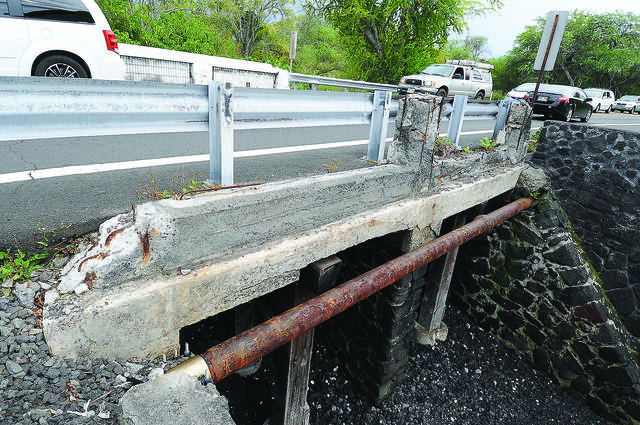KAILUA-KONA — Hawaii residents have a chance to weigh in on projects being considered for federal funding, including local efforts like the Daniel K. Inouye Highway extension and Alii Drive culvert replacement.
Comments made about the draft Statewide Transportation Improvement Program, or STIP, will be used to guide its finalization. In order to get federal funding, projects must be included in the STIP.
Annually, the state gets about $180 million in federal aid for STIP projects, said Donald Smith, Hawaii District engineer with the state Department of Transportation Highways Division.
Funds are distributed among the counties based on vehicle miles traveled. In Hawaii County, that comes to about $29 million a year, Smith said.
The list of projects being considered, which will later be whittled down to a final plan, includes about two dozen Hawaii County projects. About a quarter of those projects are throughout West and North Hawaii, while another seven would be throughout the island.
The STIP is a four-year plan listing federal, state and county transportation projects intended to be funded in part with federal money.
Projects listed on the STIP must align with the county’s long-range plan as well as the statewide transportation plan to be eligible.
Those projects also must be “ready to go” the first year they’re expected to be funded. For example, a project slated for construction must already have approved plans, specifications and estimates.
Furthermore, all projects must have the required local matching funds set.
The list of projects being considered for the upcoming STIP, planned for 2019-22, includes high-profile West Hawaii projects, such as the Daniel K. Inouye Highway extension, which would connect that road at its current terminus with Mamalahoa Highway in South Kohala to Queen Kaahumanu Highway.
The list also includes safety improvements along sections of Mamalahoa Highway in South Kona, North Kona and Ka‘u, as well as replacement of the Alii Drive culvert and Waiaka Stream Bridge in Kailua-Kona.
Tina Clothier, executive director of People’s Advocacy for Trails Hawaii was among those who attended a meeting Thursday evening about the STIP, saying she came to ask about how improvement projects would incorporate multi-modal designs to accommodate cyclists and pedestrians.
Smith said during the meeting that taking that approach “has to happen” for any new projects.
“No question,” he said. “If it’s a brand-new project, it’s in there. We’re going to have public meetings; it’s going to be a part of it.”
For improvements on existing projects though, he said, considerations can be made depending on what’s feasible. A large portion of efforts is going to be focused on resurfacing, he said, but that doesn’t rule out the opportunity for improvement.
For example, he said, that could include taking a foot out of a driving lane and making the shoulder a foot wider.
Smith said he’s looking for comments from residents to point out exactly where the needs are.
“I really need the feedback from the community to say ‘Hey, this is where I’m having issues,” he said.
Clothier after the meeting said Smith’s response was what she wanted to hear.
She added that while ensuring a multi-modal mindset is the primary concern, she’s “very interested” in prioritizing the Alii Drive culvert replacement.
That project, expected to start early next year, will replace a more than 80-year-old culvert on the Waiaha Drainageway in Kailua-Kona. Eighty percent of the roughly $12 million cost will be funded by the Federal Highway Administration.
“It’s a real pinch point on Alii Drive for motorists, for pedestrians and for cyclists,” Clothier said. “So to me that’s a really important project.”
Information on STIP development for the upcoming years is available at https://hidot.hawaii.gov/highways/other/other-related-links/stip/stip-2019-2022-2.
A PDF file of a survey listing the Hawaii Island projects is available at that website.
That survey asks residents to indicate the priority of each project. Instructions on how to submit it can be found on the last page.




Residents numbered 2. The remainders were government entities and advocate organizations.
The meeting format was presentation and participation.
Feedback was asked for existing STIP projects; feed forward by a resident for a potential project was not reported in this article.